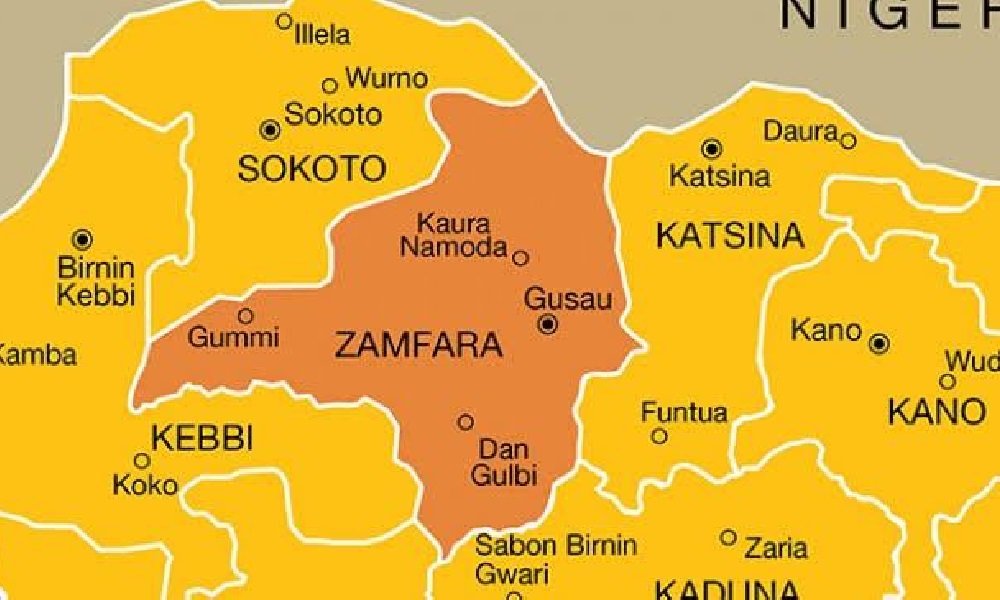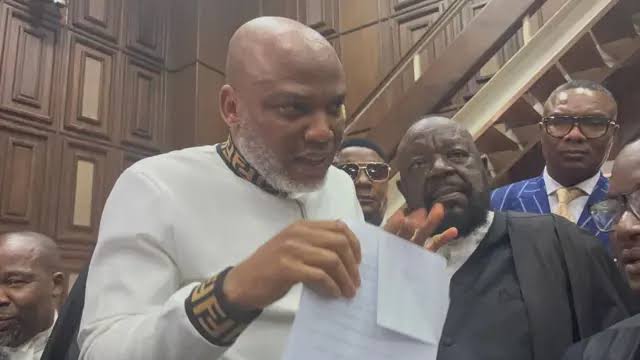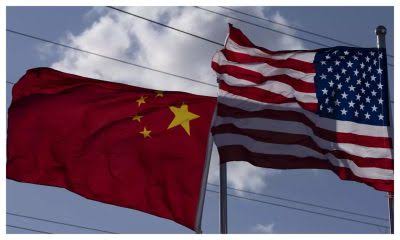News
Partners in Progress: Nigeria-China @54

News
Lawyer Arraigned For Alleged N7.25m Land Fraud

The police have arraigned a 33-year-old legal practitioner, Luka Linus Yabagi, at the Life Camp Chief Magistrates’ Court, Abuja, for allegedly cheating his client of N7.25 million.
The police charged Yabagi of Dakwa Abuja, who claimed to be a doctor of law, with cheating, criminal breach of trust, forgery and using as genuine documents.
The defendant pleaded not guilty to the charge levelled against him.
The prosecutor, Mrs Charity Nwachukwu, told the court that one Mr Mukhtar Isah of No.4 Goodluck Jonathan Street, Dakwa, Abuja, reported the matter at the Gwarinpa Police Station on Dec. 9, 2024.
Nwachukwu said that the defendant dishonestly and deceitfully made the complainant believe he had the capacity at FCDA to process and secure a land allocation for him.
She said that the defendant deceived the complainant into thinking he was going to use his application for the Statutory Right of Occupancy acknowledgement he secured with File No: 62024, in which he demanded payment.
She told the court that the defendant deceived the complainant into paying N7.25 million into his Access Bank account 1466739589, bearing Linus Befiyo Luka.
Nwachukwu said the defendant fraudulently and dishonestly gave the complainant an offer of statutory right of occupancy, a statutory right of occupancy bill, a site plan and a certificate of occupancy No. FCT/MZTP/LA/CUS/2047.
She said all the documents were bearing Paiamist Nig. Ltd as the allottee with plot No. 2233 located at Guzape II.
Nwachukwu told the court that the defendant deceitfully presented the forged document to the complainant and converted the N7.25 million he had spent on the land process and documentation to his personal use.
She also informed the court that the defendant absconded to an unknown destination, and all efforts to reach him proved abortive. However, he was later tracked and apprehended.
She said that during the police investigation, it was discovered that the purported document the defendant issued to the complainant was altered and forged and did not emanate from the Department of Land Administration.
The prosecutor told the court that the defendant could not give a satisfactory account of his actions.
Nwachukwu said that the case contravened the provisions of Sections 322, 312, 364 and 366 of the Penal Code.
The chief magistrate, Musa Jobbo, admitted the defendant to bail in the sum of N1 million and two sureties in like sum.
Jobbo ordered that the sureties must produce a reliable means of identification before the court registry.
He said that one of the sureties must be a property owner and must reside within the court’s jurisdiction.
Jobbo ordered the defendant to deposit N2 million in the FCT High Court Registry and adjourned the matter until June 19 for a hearing.
News
Zamfara Imam, three children killed after N11m ransom

Fresh waves of violence continued to sweep across parts of Nigeria on Tuesday, with reports of brutal killings in Zamfara and Benue states.
In Zamfara, bandits killed the Chief Imam of the Maru Jumu’at Mosque, Alkali Salihu Suleiman, along with his three children—despite receiving N11m of the N20m ransom they had demanded.
The tragic incident, which occurred two months after their abduction, has plunged the Maru community into mourning.
The late Imam and his children were abducted from Maru, the headquarters of Maru Local Government Area—a community long plagued by persistent bandit attacks.
A resident, Shehu Mani, told The PUNCH that the family had struggled to raise the ransom, managing to gather only N11m.
“After collecting the money, the bandits still held onto their victims,” Mani said. “Later, they demanded a new motorcycle and food items in place of the outstanding N9m. Even that could not be provided. Today, we received word from another abductee who escaped that the Imam and his children have been killed.”
While the victims’ remains had not yet been recovered, funeral prayers were already being planned in accordance with Islamic customs.
Efforts to reach the spokesperson for the Zamfara State Police Command, Yazid Abubakar, were unsuccessful as he did not respond to calls at the time of filing this report.
In a similarly disturbing development, suspected armed invaders beheaded a farmer, Felix Suega Ukir, in Tse Orkpe village, Nanev, within the Mbawa Council Ward of Guma Local Government Area in Benue State.
The community, which had previously been displaced by armed herders, is once again living in fear.
A local resident, speaking anonymously, confirmed the gruesome murder occurred on Monday.
“We found the body, but his head was missing. People are abandoning their farms again,” he said.
Former Security Adviser of Guma LGA, Christopher Waku, confirmed the incident to The PUNCH via telephone, but police spokesperson Catherine Anene stated that the command had not yet received a formal report.
As insecurity escalates across Nigeria’s North-West and North-Central regions—with renewed Boko Haram activity in the North-East and the emergence of a new terror group, Mahmdua, in Kwara and Niger States—Kwara State Governor AbdulRahman AbdulRazaq has begun ramping up local security measures.
On Tuesday, the governor met with first-class traditional rulers to strengthen grassroots security and prevent further cross-border incursions, particularly from areas like Kainji National Park, where military operations have intensified.
“We’re adopting a multi-agency approach to enhance development and protect lives,” the governor said in a statement issued by his Chief Press Secretary, Rafiu Ajakaye. “We urge royal fathers to rally their communities and assist security agencies with credible intelligence.”
The Vice Chairman of the State Council of Chiefs and Etsu Patigi, Alhaji Ibrahim Umar Bologi, commended the governor’s efforts.
“We will always support your administration. You’re doing a commendable job,” he said.
News
Kanu’s trial: DSS submits Radio Biafra devices in court

The terrorism and treason trial of the leader of the separatist Indigenous People of Biafra, Nnamdi Kanu, opened on Tuesday before the Federal High Court in Abuja with the proseuction tendering several exhibits, including Radio Biafra equipment.
At the trial, Kanu maintained that he is not a violent person as alleged by the Federal Government.
Instead, he claimed that his fight is solely for the emancipation of the people in the South-East, South-South, and parts of Benue and Kogi states.
Kanu made the statement in a written document submitted to the Department of State Services on October 15, 2015, in Lagos.
The statement was read aloud in open court during the resumed hearing of his terrorism trial.
Kanu is facing seven counts of terrorism brought against him by the Federal Government.
He was first arrested on October 14, 2015, upon his return to Nigeria from the United Kingdom. He was granted bail in 2017 on health grounds after being detained at the Kuje Correctional Centre.
However, Kanu fled to the United Kingdom after his release, only to be re-arrested in Kenya in 2021 and brought back to Nigeria, where he was detained by the DSS.
Initially facing 15 counts of terrorism and treason, eight charges were dropped by the trial court on April 8, 2022, for lack of merit.
In 2022, the Court of Appeal in Abuja ruled in Kanu’s favor, vacating the charges and ordering his release.
However, the Federal Government appealed to the Supreme Court, which, on December 15, 2023, reversed the Court of Appeal’s ruling and directed Kanu to return to trial on the remaining seven counts.
At Tuesday’s hearing, Federal Government counsel, Adegboyega Awomolo (SAN), requested that the identities of witnesses be kept confidential due to security concerns and the sensitive nature of the case.
The court ruled that while Kanu must be able to see the witnesses, they would testify behind a screen to protect their identities.
Kanu’s defence team, led by Kanu Agabi (SAN) and supported by four senior advocates, did not object to the request.
They, however, sought reciprocal cooperation from the Federal Government regarding Kanu’s bail application.
The prosecution’s first witness, identified as Mr. A.A.A., an 18-year DSS operative, testified behind a screen, recounting the events of Kanu’s arrest at the Golden Tulip Hotel in Lagos on October 14, 2015.
He described how the DSS, acting on intelligence, initially had difficulty locating Kanu, as the hotel staff claimed he was not a guest.
After receiving an order from their director, the DSS conducted a room-to-room search and found Kanu in Room 303 with a woman named Maria Ibezimakor.
Mr. A.A.A. stated that Kanu resisted arrest, head-butting one of the officers.
During the search, the DSS found a room resembling a broadcasting studio, containing various broadcasting equipment.
The items recovered, which included laptops, flash drives, microphones, mixers, pamphlets, and other materials linked to IPOB, were brought to court in four suitcases.
Kanu confirmed ownership of the equipment during interrogation, which was also admitted as evidence.
Mr. A.A.A. further testified that while they did not initially recover Kanu’s passport, the hotel manager brought the passports to their office the following morning.
The passports, bearing the name “Okwu-Kanu Nwannekaenyi Nnamdi Ngozichukwu,” were also admitted as evidence.
The witness also revealed that Kanu had checked in under the name “Nwannekaenyi Ezebuiro” and that two other women were found in another room with the same name.
The DSS also played a CD of Kanu’s interrogation, which was recorded the following day.
In the video, Kanu confirmed that he was involved in the struggle for self-determination and that he had set up Radio Biafra.
He acknowledged that he had not registered the radio station with the National Broadcasting Commission because he did not expect to receive a license.
Kanu stressed that his actions were not violent and that freedom fighting is a fundamental right, as recognised by the United Nations Charter.
He emphasised that he had never been involved in any violent activity and had been interrogated by the DSS without legal representation, as required by law.
The court admitted both the statement and video clips as evidence.
The trial was adjourned to May 2 for cross-examination and to hear testimony from a second prosecution witness.
-

 Opinion23 hours ago
Opinion23 hours agoTHOUGHTS ON CONSTITUENTS DEVELOPMENT IN OBIO-AKPOR
-

 News18 hours ago
News18 hours agoJust in: Popular Nigerian billionaire, E-Money nabbed by EFCC
-

 News18 hours ago
News18 hours agoKing Sunny Ade’s family opens up over his whereabouts after daughter’s alarm
-

 Politics14 hours ago
Politics14 hours agoJust in: Ex- Gov Okowa accepts betraying Southern Nigeria, laments running with Atiku
-

 News19 hours ago
News19 hours agoEx-DIG,Olofu debunks online newspaper report, says ” I retired from NPF meritously after 35yrs service
-

 News14 hours ago
News14 hours agoBoko Haram Kill Mourners, Kidnap Others In Borno
-

 News14 hours ago
News14 hours agoDeputy Speaker Leads Defection of PDP Stalwart Chris Igwe, 13,000 Followers to APC In Abia
-

 Economy22 hours ago
Economy22 hours agoStock Market Surges: N228bn Gain Sets the Tone for a Strong Trading to Week

















